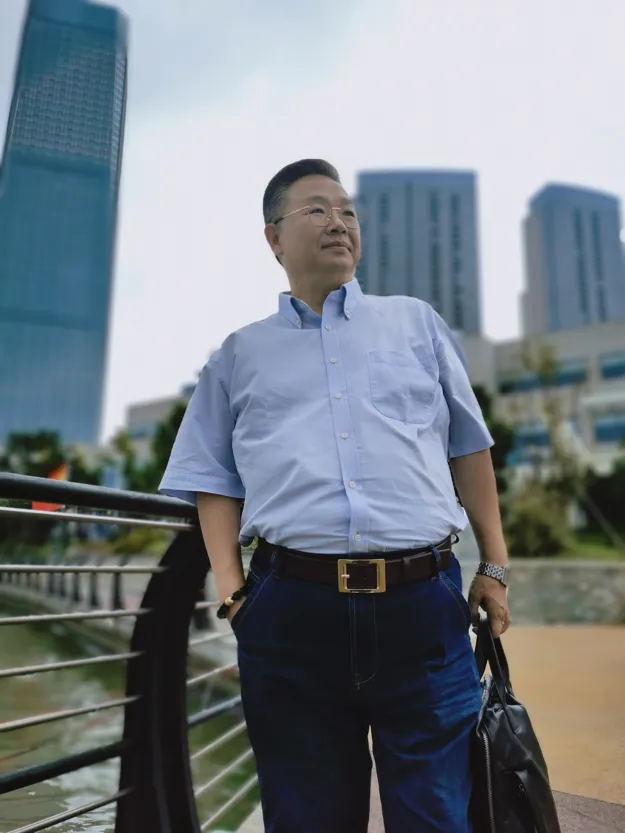In the last article, we invited Mr. Lin Pubin, President of HX Agriculture B.V. Asia Pacific, to share the opportunities for Dutch companies in the Chinese market. The HX Agriculture team has been working in China for more than 20 years and has established good cooperation with the Chinese government, aiming to help Dutch companies better integrate into China. Mr. Lin Pubin also shares some of the efforts made by the HX Agriculture team in China.
 Photo: Mr. Lin Pubin, President of HX Agriculture Asia Pacific
Photo: Mr. Lin Pubin, President of HX Agriculture Asia Pacific
Building benchmarking projects
"We are now working with various local governments in China to build benchmarking projects and speed up the use of these benchmarking projects to cultivate talents who can use Dutch technologies. We have several starting points for benchmarking demonstration projects. First, the scale of benchmarking projects must reach a profitable scale. That is, the minimum area is 5 hectares. Dutch technologies have been introduced to China about 20 years ago. People think that the Dutch technologies are very good, but they cannot help the growers to make profits in China. One reason is that the scale has not been achieved. We're trying to change it by increasing the operational scale. "
"In addition, the site selection of each benchmark project must be adapted to local conditions, taking into account energy consumption, operating costs, climate conditions, plant characteristics, and other aspects in order to obtain a reasonable return on investment. Over the past 20 years, we have traveled to different provinces and cities in China. From Jiamusi to Hainan Island, from Shanghai to Ili, each region has its own unique climate and environmental characteristics, which need to be discovered and understood little by little. Through the construction of benchmark projects, domestic capital, central enterprises, state-owned enterprises, and even Dutch planting enterprises will be guided to gather, thereby driving the formation of local industrial clusters.
Targeted and systematic training of talents
"The lack of talent is the biggest challenge facing China's horticulture at present. Modern agriculture is a highly specialized industry with higher and higher demands on people. We hope that our employees can choose a direction and continue to make efforts. For example, people who grow tomatoes just grow tomatoes exclusively. We divide personnel training into three levels, from day-to-day industrial workers to mid-level managers and senior managers. We select junior talents from colleges and universities and then continue to train them to increase practical knowledge on the basis of their theoretical knowledge. The talent pool is carried out through the training facilities of the DGD, the PIB consortium, and the strength of the Dutch horticultural educational institutes. "
Support from the financial system
In the Netherlands, the financial service system for agriculture is relatively complete, which can provide farmers with lease financing for equipment. Protected agriculture is not considered a fixed asset in China, and it is very difficult to obtain support from commercial banks. The investment in modern horticulture equipment is huge. The investment in a 5-hectare greenhouse is hundreds of millions, and the high cost also hinders the process of agricultural development. We have two ways to solve this problem. The first is to cooperate with central enterprises, state-owned enterprises, and local industry guidance funds to establish special funds. When someone wants to enter the agricultural industry but lacks capital, including Dutch agricultural professionals who want to come to China to start a business, we can provide them with financial support. These special financial instruments support the development of local agricultural investment projects and create benchmark projects, thus forming a virtuous circle.
Thinking about energy
"A major feature of protected agriculture is sustainable development. According to our statistics, in China, energy costs account for more than 35% of the total cost of greenhouses, which is much higher than in Europe. We hope to reduce the energy cost to 22% or 20% by comprehensively utilizing various energy sources and adjusting measures to local conditions. Only in this way can the greenhouse operation achieve a good return on investment. Therefore, when selecting the site, special consideration should be given to local natural conditions, and resources such as lakes, geothermal heat, and cold springs should be utilized.
Proximity to urban production is a major trend in current development. Producing close to the economic circle can reduce logistics costs and reduce carbon footprint. At the same time, it reduces the loss during transportation. At present, the loss during the transportation is very large, accounting for about 25%. Dutch companies need to give full play to their advantages in the field of green and modern urban agriculture, which is currently lacking in China.
The planting of functional leafy vegetables is developing very fast in East China. The younger generation's pursuit of healthy and nutritious food has pushed up the demand, and modern production can well ensure traceability. For example, the goji berry is one of the most distinctive products in China, but the current product structure is single because its planting technology and post-preservation section are not perfect, and it has a very high added value of processing. In the development of modern protected agriculture in China, in addition to common crops such as tomatoes and cucumbers, other local agricultural products are also worth considering. "
More information:
HX Agriculture B.V.
Thijs Maathuis
Email: [email protected]
www.hx-agri.nl
